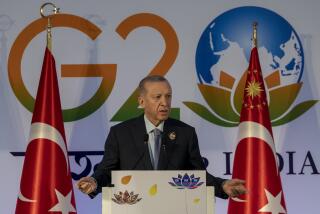Iraq to help Turkey fight rebels
BAGHDAD — Prime Minister Nouri Maliki on Thursday promised to help his Turkish counterpart crack down on Kurdish guerrillas along Turkey’s border, as Iraq attempts to mend relations with its neighbors.
The pledge was made during a visit by Prime Minister Recep Tayyip Erdogan, the first by a Turkish leader to Baghdad in 18 years. The visit was a diplomatic victory for Maliki, who has been touring regional capitals in a bid to persuade his counterparts to normalize relations with Iraq and help the country rebuild.
In another sign of progress, Kuwait said Thursday that it planned to appoint an ambassador to Iraq, its first since then-Iraqi President Saddam Hussein invaded the country in 1990.
Iraq maintains important economic ties with its neighbors but has been diplomatically isolated since U.S.-led forces toppled Hussein’s Sunni Arab regime in April 2003. Of Iraq’s neighbors, only Turkey and Iran, which also are its only non-Arab neighbors, have maintained full embassies in Baghdad.
Baghdad’s relations with Ankara have been strained by the activities of the Kurdistan Workers Party, or PKK, a guerrilla group that uses bases in northern Iraq to fight for Kurdish autonomy in southeastern Turkey. The United States and Turkey have designated the PKK a terrorist group.
Using intelligence supplied by the U.S., Turkey sent thousands of ground troops across the border in February to attack PKK bases, drawing protests from Iraqi leaders.
Turkish officials said at the time that Iraq was not doing enough to crush the rebels, who are holed up in the mountains of Iraq’s semiautonomous Kurdistan region. But Erdogan said Thursday at a news conference with Maliki that he had received assurances of support from authorities in Baghdad and the north.
“This terrorist organization is not only Turkey’s enemy but also an enemy to Iraq,” Erdogan said. “We will not allow this organization to poison the relationship between the two countries.”
In return, Erdogan said he hoped to increase the value of trade between Turkey and Iraq to $25 billion in the next three years from $3.5 billion in 2007. He also urged Iraq’s other neighbors to do more to promote stability in the troubled country.
“The future of Iraq is the future of the region,” Erdogan said.
“It is important to give more support on both the bilateral and regional level.”
The leaders signed an agreement establishing a ministerial-level council to advance relations on the cultural, political, security, economic and energy fronts.
Maliki underscored the two countries’ “long-standing shared interests and challenges, such as the threat of terrorism which seeks to destabilize the region as whole.”
“Our successes against terrorists and criminals have prepared us to start reconstruction and attracting investment,” Maliki said.
With violence levels in Iraq at a four-year low, Maliki has turned his attention to improving relations with regional countries, many of them Sunni Arab nations suspicious of Iraq’s close ties with Shiite-led Iran. Iranian President Mahmoud Ahmadinejad visited in March, the only other leader of a neighboring country to travel to Iraq since Hussein was ousted.
Arab countries also have been put off by the level of violence in Iraq. Sunni Arab militants have targeted diplomats in a bid to isolate the Shiite-led Iraqi government. An envoy whom Egypt sent to Iraq in 2005 with the intention of moving toward full diplomatic relations was kidnapped and killed.
Maliki’s recent crackdowns against Shiite Muslim militants in Baghdad and southern Iraq appear to have boosted regional confidence in his government. U.S. officials also have been pressing reluctant Arab countries to restore diplomatic ties.
Jordan and the United Arab Emirates have designated envoys, and Bahrain has indicated that it will do so soon. Jordan’s King Abdullah II had been expected to visit Iraq this week but postponed the trip without explanation.
Although less pervasive, violence continues in Iraq.
A suicide car bomber targeting an Iraqi army patrol Thursday in west Baghdad killed four civilians and injured 10, police said. Across town, a roadside bomb targeting traffic policemen killed one person and injured five.
And in the northern city of Mosul, gunmen assassinated the Iraqi brigadier general who was responsible for issuing identification documents, police said.
--
Special correspondents in Baghdad contributed to this report.
More to Read
Sign up for Essential California
The most important California stories and recommendations in your inbox every morning.
You may occasionally receive promotional content from the Los Angeles Times.










